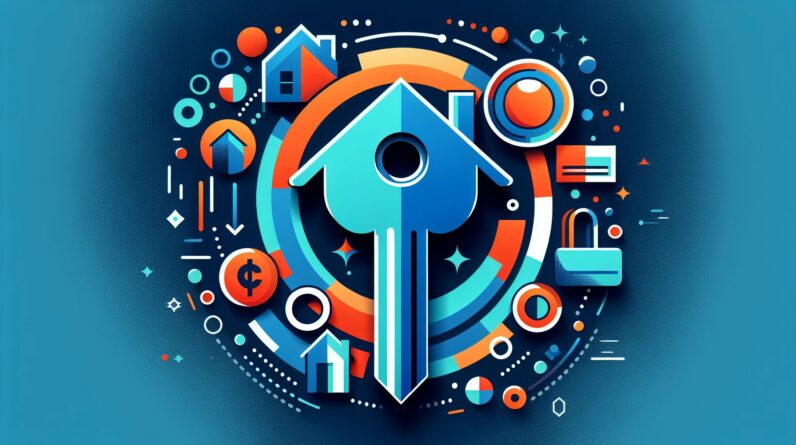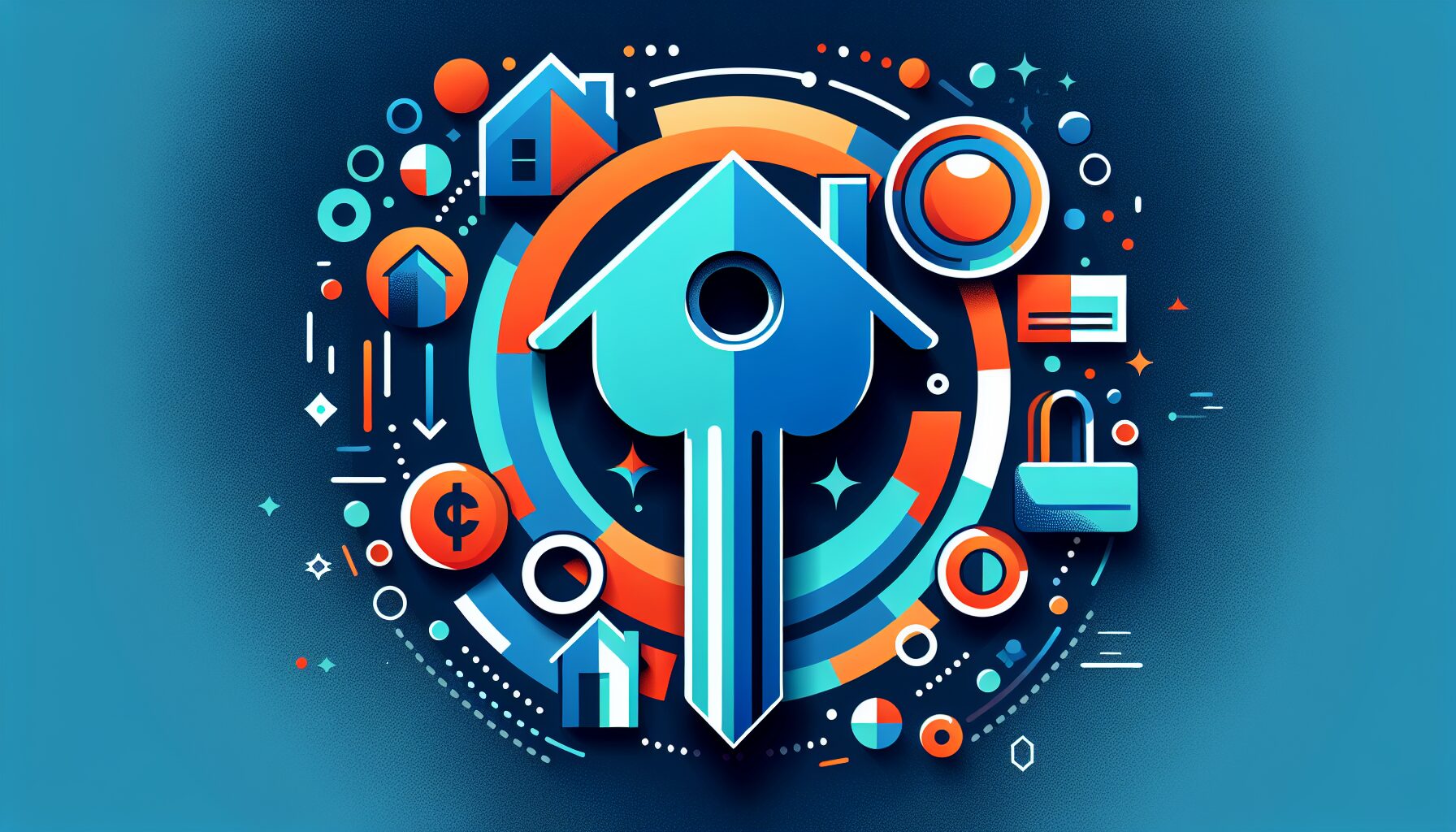
You’ve probably heard the term “mortgage” before, but do you really know what it means? A mortgage is a type of loan that allows you to buy a property without having to pay for it all at once. Instead, you make regular payments over a fixed period of time, typically 15 to 30 years. This article will explain the different types of mortgages available and help you understand which one might be the right fit for you. Whether you’re a first-time homebuyer or looking to refinance, understanding the basics of mortgage loans is essential. So, let’s dive in and demystify the world of mortgages!

Table of Contents
Understanding Mortgage Loans
Definition of a Mortgage Loan
A mortgage loan is a type of loan that allows individuals or couples to borrow money from a financial institution, such as a bank, to purchase a property. The borrowed amount is secured by the property itself, which serves as collateral for the loan. The borrower agrees to repay the loan amount, plus interest, over a specified period of time, typically in monthly installments.
Importance of Mortgage Loans
Mortgage loans play a crucial role in enabling individuals and families to become homeowners. They provide a means for people to afford the high cost of real estate and fulfill their dreams of owning a house. Additionally, mortgage loans stimulate the housing market and contribute to the overall growth of the economy by creating demand and supporting various industries related to home buying, such as construction, interior design, and real estate.
Key Players in Mortgage Loans
There are several key players involved in the mortgage loan process. The borrower, or homebuyer, is the individual seeking to obtain a mortgage loan to purchase a property. The lender is the financial institution or bank that provides the loan to the borrower. Mortgage brokers act as intermediaries between the borrower and the lender, helping individuals find suitable loan options and navigate the application and approval process. Lastly, loan officers are employed by the lender and assist borrowers in completing their loan applications and provide guidance throughout the loan process.
Different Types of Mortgage Loans
Fixed-Rate Mortgage Loan
A fixed-rate mortgage loan is one of the most common types of mortgage loans. With this type of loan, the interest rate remains constant throughout the entire loan term. This means that your monthly mortgage payments will also remain the same, providing stability and predictability. Fixed-rate mortgage loans are typically available in 15-year and 30-year terms, allowing borrowers to choose a repayment schedule that suits their financial goals and budget.
Adjustable-Rate Mortgage Loan
An adjustable-rate mortgage loan, also known as an ARM, is a type of mortgage loan where the interest rate is variable and can change over time. Typically, ARM loans have an initial fixed-rate period, usually between 5 to 10 years, followed by an adjustable rate based on an index, such as the U.S. Prime Rate or the London Interbank Offered Rate (LIBOR). This means that your monthly mortgage payments can fluctuate, depending on changes in the interest rate. ARM loans can be beneficial for borrowers who expect interest rates to decrease in the future or plan to sell the property before the adjustable rate comes into effect.
Government-Backed Mortgage Loan
Government-backed mortgage loans are loans that are insured or guaranteed by a government agency. These loans are designed to make homeownership more accessible and affordable, particularly for low-income individuals and first-time homebuyers. Examples of government-backed mortgage loans include the Federal Housing Administration (FHA) loans, U.S. Department of Veterans Affairs (VA) loans, and U.S. Department of Agriculture (USDA) loans. These loans often have more flexible requirements and lower down payment options compared to conventional loans.
Conventional Mortgage Loan
A conventional mortgage loan is a type of mortgage loan that is not insured or guaranteed by a government agency. These loans are typically offered by private lenders, such as banks or credit unions. Conventional loans often require a higher down payment and have stricter qualification criteria compared to government-backed loans. However, they offer flexibility in terms of loan amount, repayment period, and interest rate options. Conventional loans are a popular choice for borrowers with good credit scores and a stable financial history.
Jumbo Mortgage Loan
A jumbo mortgage loan is a type of loan that exceeds the conforming loan limits set by government-sponsored enterprises like Fannie Mae and Freddie Mac. These loan limits vary by location, but they generally range from $548,250 to $822,375 in most parts of the United States. Jumbo loans are typically used for high-value properties or when the borrower requires a loan amount that exceeds the limits set by conventional loan programs. They often come with stricter qualification requirements and higher interest rates due to the increased risk for lenders.
Fixed-Rate Mortgage Loan
Definition
A fixed-rate mortgage loan is a type of mortgage loan where the interest rate remains constant throughout the duration of the loan. Regardless of any changes in the overall interest rate market, your monthly mortgage payments will remain the same.
Features
Fixed-rate mortgage loans have several features that make them a popular choice for many homebuyers. The most prominent feature is the stability offered by the fixed interest rate. Knowing that your monthly mortgage payments will not change provides peace of mind and allows for better budgeting and financial planning. Additionally, fixed-rate loans often have longer repayment terms, typically ranging from 15 to 30 years, which can result in lower monthly payments compared to shorter-term loans.
Benefits
One of the primary benefits of a fixed-rate mortgage loan is the predictability it offers. With a fixed interest rate, you can accurately plan your budget knowing that your mortgage payments will remain constant over time. This stability allows for better financial management and reduces the risk of unexpected changes in your monthly housing expenses. Additionally, fixed-rate loans eliminate the uncertainty associated with fluctuating interest rates, protecting borrowers from potential payment shock due to increasing interest rates.
Considerations
While fixed-rate mortgage loans provide stability and predictability, there are a few considerations to keep in mind. The interest rates for fixed-rate loans tend to be slightly higher compared to adjustable-rate loans, as the lender is assuming the risk of potential interest rate increases in the future. Additionally, refinancing a fixed-rate loan can be more challenging and may involve additional costs compared to refinancing an adjustable-rate loan. It is essential to carefully evaluate your financial goals, long-term plans, and budget constraints before deciding on a fixed-rate mortgage loan.
Adjustable-Rate Mortgage Loan
Definition
An adjustable-rate mortgage loan, commonly referred to as an ARM loan, is a type of mortgage loan where the interest rate can change periodically during the loan term. The initial interest rate is typically fixed for a specific period, after which it adjusts based on market conditions and an index rate.
Features
The primary feature of an adjustable-rate mortgage loan is the variability of the interest rate. During the initial fixed-rate period, usually between 5 to 10 years, the interest rate remains unchanged. However, once this period ends, the rate adjusts periodically based on an index. The frequency and method of adjustment, as well as the caps and limits on rate changes, are determined by the terms of the loan. Adjustable-rate loans often have lower initial interest rates compared to fixed-rate loans, making them more affordable in the short term.
Benefits
One of the significant benefits of an adjustable-rate mortgage loan is the potential for lower initial monthly mortgage payments. The lower initial interest rate during the fixed-rate period can allow borrowers to qualify for a larger loan or free up funds for other financial goals. These loans can be advantageous if you plan to sell the property or refinance before the adjustable-rate period begins, as you can take advantage of the lower initial rate without experiencing any potential rate increase.
Considerations
While adjustable-rate mortgage loans offer lower initial rates, there are considerations to weigh. The periodic adjustments of the interest rate introduce uncertainty and can result in higher monthly mortgage payments when rates increase. This payment shock can put a strain on your budget and financial stability. It is crucial to carefully assess your risk tolerance, long-term plans, and financial capacity to absorb potential rate increases before committing to an adjustable-rate mortgage loan.

Government-Backed Mortgage Loan
Definition
A government-backed mortgage loan is a type of loan that is insured or guaranteed by a government agency. These loans are designed to provide financial assistance to homebuyers who may have difficulty qualifying for conventional loans due to lower credit scores, limited down payment funds, or other financial constraints.
Types of Government-Backed Mortgage Loans
There are three primary types of government-backed mortgage loans:
-
Federal Housing Administration (FHA) loans: These loans are insured by the FHA, a division of the U.S. Department of Housing and Urban Development (HUD). FHA loans offer more lenient qualification criteria, lower down payment requirements, and more flexible repayment options compared to conventional loans.
-
U.S. Department of Veterans Affairs (VA) loans: VA loans are available to eligible veterans, active-duty service members, and surviving spouses. These loans provide various benefits, including no down payment requirements, no mortgage insurance, and competitive interest rates.
-
U.S. Department of Agriculture (USDA) loans: USDA loans are intended to promote rural development and homeownership in eligible rural and suburban areas. These loans offer low to no down payment options and competitive fixed interest rates.
Features
Government-backed mortgage loans often have unique features that make them more accessible to a broader range of borrowers. These features include more lenient credit score requirements, lower down payment options, and flexible income and debt ratio guidelines. Additionally, some of these loans may offer the possibility of financing certain home improvements or repairs as part of the loan amount.
Benefits
The primary benefit of government-backed mortgage loans is increased accessibility to homeownership for borrowers who may not qualify for conventional loans. These loans provide an opportunity for individuals with lower credit scores or limited funds for a down payment to realize their dream of owning a home. The more flexible qualification criteria and additional support provided by government agencies contribute to a smoother loan approval process and increased peace of mind for borrowers.
Considerations
While government-backed mortgage loans offer benefits, there are considerations to keep in mind. Some of these loans may require additional fees or insurance premiums, such as the FHA mortgage insurance premium or the VA funding fee. It is essential to evaluate the long-term costs of these loans and compare them to conventional loan options. Additionally, government-backed loans may have geographical restrictions or income limits, so it is crucial to verify eligibility requirements before pursuing these loan types.
Conventional Mortgage Loan
Definition
A conventional mortgage loan is a type of loan that is not insured or guaranteed by a government agency. These loans are typically offered by private lenders, such as banks or credit unions.
Features
Conventional mortgage loans have several key features. Unlike government-backed loans that have specific requirements, conventional loans allow for more flexibility in terms of loan amount, repayment period, and qualifying criteria. These loans often require a higher down payment and have stricter credit score and debt-to-income ratio requirements compared to government-backed loans. Conventional loans also offer various fixed and adjustable interest rate options, allowing borrowers to select a loan product that best suits their financial needs.
Benefits
Conventional mortgage loans provide flexibility and options for borrowers with good credit scores, stable income, and a solid financial history. These loans often do not require private mortgage insurance (PMI) if the borrower has a down payment of at least 20 percent of the property’s purchase price. Additionally, conventional loans can offer competitive interest rates and more straightforward refinancing options compared to government-backed loans.
Considerations
While conventional mortgage loans offer benefits, they may not be accessible to all borrowers. The higher down payment requirement, typically ranging from 5 to 20 percent, can be a barrier for some individuals who do not have significant savings. Additionally, stricter credit score and debt-to-income ratio requirements may make it more challenging for borrowers with lower credit scores or higher debt levels to qualify for a conventional loan. It is crucial to assess your financial situation and consult with a mortgage professional to determine if a conventional loan is the right choice for you.

Jumbo Mortgage Loan
Definition
A jumbo mortgage loan is a type of loan that exceeds the conforming loan limits set by government-sponsored enterprises like Fannie Mae and Freddie Mac.
Features
Jumbo mortgage loans have specific features that differentiate them from conventional loans. The most notable feature is the higher loan amount that exceeds the conforming loan limits. Since these loans carry higher risks for lenders, they often require more stringent qualification criteria, such as higher credit scores and lower debt-to-income ratios. Jumbo loans may also have higher interest rates compared to conventional loans.
Benefits
Jumbo mortgage loans allow borrowers to finance the purchase of high-value properties or acquire larger loan amounts that exceed the limits set by conventional loan programs. These loans provide an opportunity for individuals who require a more substantial loan to fulfill their homeownership goals. Jumbo loans can offer flexibility in terms of property selection, allowing borrowers to choose from a wider range of luxury or unique properties.
Considerations
While jumbo mortgage loans offer benefits, there are considerations to keep in mind. These loans often have higher interest rates and stricter qualification requirements, making them more challenging to obtain. Jumbo loans may also require a higher down payment, typically ranging from 20 to 30 percent of the property’s purchase price. It is crucial to carefully evaluate your financial situation and consult with a mortgage professional to determine if a jumbo loan is the right fit for your needs and goals.
Factors to Consider When Choosing a Mortgage Loan
Interest Rates
One of the most critical factors to consider when choosing a mortgage loan is the interest rate. The interest rate plays a significant role in determining your monthly mortgage payment and the overall cost of the loan. It is essential to compare interest rates from different lenders to secure the most favorable rate for your financial situation.
Loan Term
The loan term refers to the length of time you have to repay the mortgage loan in full. Common loan terms for mortgage loans are 15 years and 30 years. Shorter loan terms typically result in higher monthly payments but can save you money in interest over the life of the loan. Longer loan terms offer lower monthly payments but may result in higher interest costs.
Down Payment
The down payment is the initial cash payment made towards the purchase price of the property. The amount of the down payment can vary depending on the loan type and lender requirements. A larger down payment can result in a lower loan amount, reduced monthly payments, and potentially eliminate the need for private mortgage insurance.
Credit Score
Your credit score is an essential factor in determining your eligibility for a mortgage loan and the interest rate you will be offered. Lenders use credit scores to assess your creditworthiness and evaluate the risk of lending to you. Higher credit scores generally result in more favorable loan terms, including lower interest rates.
Closing Costs
Closing costs are fees associated with the mortgage loan and the transfer of ownership of the property. These costs can include appraisal fees, title insurance, attorney fees, and other administrative charges. It is important to consider closing costs when evaluating the total cost of obtaining a mortgage loan and factor them into your budget.
Prepayment Penalties
Some mortgage loans may have prepayment penalties if you pay off the loan early or make significant extra payments. Prepayment penalties can significantly impact your ability to save money by refinancing or paying off the loan early. It is crucial to understand the terms of the loan and any potential prepayment penalties before committing to a specific mortgage loan.

The Mortgage Loan Process
Application
The first step in the mortgage loan process is the application. You will need to complete a loan application, provide necessary documentation such as income and asset verification, and disclose information about the property you intend to purchase. The lender will review your application and evaluate your eligibility for a mortgage loan based on factors such as creditworthiness, income, and debt obligations.
Pre-Approval
After reviewing your application, the lender may issue a pre-approval letter. A pre-approval letter provides an estimate of the loan amount you may qualify for based on the lender’s evaluation of your financial situation. Pre-approval can give you an advantage when making an offer on a property, as it demonstrates to sellers that you are a serious buyer who has the financial means to secure financing.
Choosing a Lender
Once you have been pre-approved, you can begin shopping for a mortgage lender. It is important to compare lenders and loan offers to find the best terms and conditions for your needs. Consider factors such as interest rates, loan fees, customer service, and reputation when selecting a lender.
Property Appraisal
During the mortgage loan process, the lender will require a property appraisal to determine the fair market value of the property. An appraiser will visit the property and evaluate its condition, location, and comparable sales in the area to assess its value. The appraisal is important to ensure that the property’s value supports the loan amount.
Underwriting
After the appraisal, the loan file enters the underwriting stage. Underwriters review all aspects of the loan application, including credit history, income documentation, and property appraisal, to assess the borrower’s ability to repay the loan and the overall risk of the loan. The underwriter may request additional documentation or clarification during this process.
Loan Approval
Once the underwriting process is complete, the lender will issue a loan approval or conditional loan approval. A loan approval indicates that the borrower has met all requirements, and the lender is prepared to fund the mortgage loan. A conditional loan approval may require additional documentation or conditions to be met before final approval and loan funding.
Closing
The final step in the mortgage loan process is the closing. At closing, the borrower will review and sign the loan documents, including the promissory note, mortgage or deed of trust, and other necessary paperwork. The closing agent or attorney will collect any required funds, such as the down payment and closing costs. Once all documents are signed, and funds are collected, the property officially transfers to the borrower, and the mortgage loan becomes effective.
Conclusion
Understanding the different types of mortgage loans and the factors to consider when choosing a loan is crucial for anyone planning to buy a property. Whether you opt for a fixed-rate mortgage loan, adjustable-rate mortgage loan, government-backed mortgage loan, conventional mortgage loan, or jumbo mortgage loan, it is essential to evaluate your financial goals, budget, and long-term plans before making a decision. By carefully considering the various loan options and working with a knowledgeable mortgage professional, you can make an informed choice that aligns with your needs and helps you achieve the dream of homeownership.








